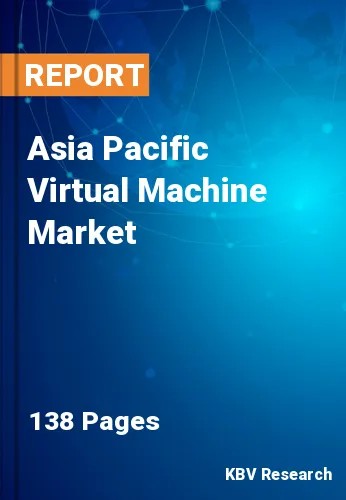Chapter 1. Market Scope & Methodology
1.1 Market Definition
1.2 Objectives
1.3 Market Scope
1.4 Segmentation
1.4.1 Asia Pacific Virtual Machine Market, by Type
1.4.2 Asia Pacific Virtual Machine Market, by Organization Size
1.4.3 Asia Pacific Virtual Machine Market, by Vertical
1.4.4 Asia Pacific Virtual Machine Market, by Country
1.5 Methodology for the research
Chapter 2. Market at a Glance
2.1 Key Highlights
Chapter 3. Market Overview
3.1 Introduction
3.1.1 Overview
3.1.1.1 Market Composition and Scenario
3.2 Key Factors Impacting the Market
3.2.1 Market Drivers
3.2.2 Market Restraints
3.2.3 Market Opportunities
3.2.4 Market Challenges
Chapter 4. Competition Analysis - Global
4.1 KBV Cardinal Matrix
4.2 Recent Industry Wide Strategic Developments
4.2.1 Partnerships, Collaborations and Agreements
4.2.2 Product Launches and Product Expansions
4.3 Market Share Analysis, 2022
4.4 Top Winning Strategies
4.4.1 Key Leading Strategies: Percentage Distribution (2020-2024)
4.4.2 Key Strategic Move: (Product Launches and Product Expansions: 2021, Mar – 2024, Feb) Leading Players
4.5 Porter’s Five Forces Analysis
Chapter 5. Asia Pacific Virtual Machine Market, By Type
5.1 Asia Pacific System Virtual Machine Market, By Country
5.2 Asia Pacific Process Virtual Machine Market, By Country
Chapter 6. Asia Pacific Virtual Machine Market, By Organization Size
6.1 Asia Pacific SMEs Market, By Country
6.2 Asia Pacific Large Enterprises Market, By Country
Chapter 7. Asia Pacific Virtual Machine Market, By Vertical
7.1 Asia Pacific BFSI Market, By Country
7.2 Asia Pacific Telecommunications & ITES Market, By Country
7.3 Asia Pacific Government & Public Sector Market, By Country
7.4 Asia Pacific Healthcare & Life Sciences Market, By Country
7.5 Asia Pacific Others Market, By Country
Chapter 8. Asia Pacific Virtual Machine Market, By Country
8.1 China Virtual Machine Market
8.1.1 China Virtual Machine Market, By Type
8.1.2 China Virtual Machine Market, By Organization Size
8.1.3 China Virtual Machine Market, By Vertical
8.2 Japan Virtual Machine Market
8.2.1 Japan Virtual Machine Market, By Type
8.2.2 Japan Virtual Machine Market, By Organization Size
8.2.3 Japan Virtual Machine Market, By Vertical
8.3 India Virtual Machine Market
8.3.1 India Virtual Machine Market, By Type
8.3.1.1.1 India Virtual Machine Market, By Organization Size
8.3.2 India Virtual Machine Market, By Vertical
8.4 South Korea Virtual Machine Market
8.4.1 South Korea Virtual Machine Market, By Type
8.4.2 South Korea Virtual Machine Market, By Organization Size
8.4.3 South Korea Virtual Machine Market, By Vertical
8.5 Singapore Virtual Machine Market
8.5.1 Singapore Virtual Machine Market, By Type
8.5.2 Singapore Virtual Machine Market, By Organization Size
8.5.3 Singapore Virtual Machine Market, By Vertical
8.6 Malaysia Virtual Machine Market
8.6.1 Malaysia Virtual Machine Market, By Type
8.6.2 Malaysia Virtual Machine Market, By Organization Size
8.6.3 Malaysia Virtual Machine Market, By Vertical
8.7 Rest of Asia Pacific Virtual Machine Market
8.7.1 Rest of Asia Pacific Virtual Machine Market, By Type
8.7.2 Rest of Asia Pacific Virtual Machine Market, By Organization Size
8.7.3 Rest of Asia Pacific Virtual Machine Market, By Vertical
Chapter 9. Company Profiles
9.1 Amazon.com, Inc.
9.1.1 Company Overview
9.1.2 Financial Analysis
9.1.3 Segmental Analysis
9.1.4 SWOT Analysis
9.2 Citrix Systems, Inc. (Cloud Software Group, Inc.)
9.2.1 Company Overview
9.2.2 Recent strategies and developments:
9.2.2.1 Product Launches and Product Expansions:
9.2.3 SWOT Analysis
9.3 Hewlett Packard Enterprise Company
9.3.1 Company Overview
9.3.2 Financial Analysis
9.3.3 Segmental and Regional Analysis
9.3.4 Research & Development Expense
9.3.5 Recent strategies and developments:
9.3.5.1 Partnerships, Collaborations, and Agreements:
9.3.5.2 Product Launches and Product Expansions:
9.3.6 SWOT Analysis
9.4 Huawei Technologies Co., Ltd. (Huawei Investment & Holding Co., Ltd.)
9.4.1 Company Overview
9.4.2 Financial Analysis
9.4.3 Segmental and Regional Analysis
9.4.4 Research & Development Expense
9.4.5 SWOT Analysis
9.5 IBM Corporation
9.5.1 Company Overview
9.5.2 Financial Analysis
9.5.3 Regional & Segmental Analysis
9.5.4 Research & Development Expenses
9.5.5 Recent strategies and developments:
9.5.5.1 Partnerships, Collaborations, and Agreements:
9.5.6 SWOT Analysis
9.6 Microsoft Corporation
9.6.1 Company Overview
9.6.2 Financial Analysis
9.6.3 Segmental and Regional Analysis
9.6.4 Research & Development Expenses
9.6.5 Recent strategies and developments:
9.6.5.1 Product Launches and Product Expansions:
9.6.6 SWOT Analysis
9.7 Oracle Corporation
9.7.1 Company Overview
9.7.2 Financial Analysis
9.7.3 Segmental and Regional Analysis
9.7.4 Research & Development Expense
9.7.5 Recent strategies and developments:
9.7.5.1 Partnerships, Collaborations, and Agreements:
9.7.5.2 Product Launches and Product Expansions:
9.7.6 SWOT Analysis
9.8 VMware, Inc. (Broadcom Inc.)
9.8.1 Company Overview
9.8.2 Financial Analysis
9.8.3 Segmental and Regional Analysis
9.8.4 Research & Development Expense
9.8.5 Recent strategies and developments:
9.8.5.1 Partnerships, Collaborations, and Agreements:
9.8.6 SWOT Analysis
9.9 Google LLC (Alphabet Inc.)
9.9.1 Company Overview
9.9.2 Financial Analysis
9.9.3 Segmental and Regional Analysis
9.9.4 Research & Development Expense
9.9.5 Recent strategies and developments:
9.9.5.1 Partnerships, Collaborations, and Agreements:
9.9.5.2 Product Launches and Product Expansions:
9.9.6 SWOT Analysis
9.10. Parallels Inc. (Cascade Parent Limited)
9.10.1 Company Overview
9.10.2 Recent strategies and developments:
9.10.2.1 Partnerships, Collaborations, and Agreements:
9.10.2.2 Product Launches and Product Expansions:
9.10.3 SWOT Analysis

